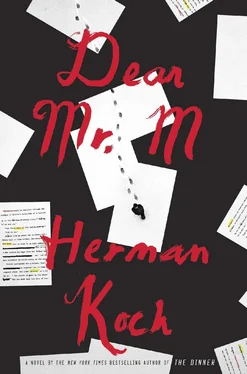Sometimes I imagine that I am being filmed by someone in a van parked across the street. A nondescript van with the name of a construction or plumbing firm on the side. An undercover operation, with a hole drilled in one of the o ’s of “construction,” the glass of the camera’s lens visible perhaps only from up close. A telephoto lens, the images are blurry, grainy — but nothing strange is going on. I don’t take any mail upstairs with me in order to steam open the envelopes at my leisure. I don’t look at the envelopes any longer than is needed to read the name of the recipient. Personal letters are becoming less common, unmistakably so, and postcards only show up during vacations.
That is how I looked this morning at the postcard from your wife. I moved it up closer to my eyes, as though I were having trouble reading the address. Fortunately, girlish handwriting is very easy to read. For the space of a single second, I thought about the van across the street. That’s why I shook my head briefly, as though realizing my mistake a bit too late — as though it had taken me a second to see that the postcard was not intended for me, but for my upstairs neighbor. Then I smiled. I flipped the card over, glanced at the picture on the front, and put it in your mailbox.
They can do all kinds of things these days. They can zoom in on a grainy picture and blow it up a million times. Imagine that there really had been a van parked across the street this morning: by zooming in and blowing up enough they could have seen which postcard I had read in a second and to whom that postcard was addressed.
There was nothing visibly suspicious about it, but still, they could have reconstructed my knowledge of her whereabouts based on the combination of text and picture.
That was the real reason why I shook my head. Why I smiled. I smiled because now I knew where she was. And I shook my head because, of course, I should have figured that out for myself a long time ago.
After coming out of the shower last Saturday, you went to the café across from here. When I heard your door shut I walked out onto my balcony, where I can see the street. You don’t know how to make coffee. You don’t know that butter should be kept outside the fridge. You would only burn yourself if you tried to heat some milk.
You took a seat outside and opened the newspaper. After a few minutes you looked around to see if anyone was coming to take your order, but none of the waitstaff had come out yet. You were the only customer. You put down your paper and turned in your chair, the better to peer into the restaurant itself.
It was a lovely day. One of the first sidewalk-café days of the year. Sunlight bounced brightly off the big windows. You shielded your eyes with one hand and peered inside, but you probably couldn’t see a thing. If you had looked up, you would have seen me standing there. If it hadn’t been so far away, you probably could have seen the smile on my face. I felt for you. Really, I did.
The café is a fairly new one. Even before it opened, everyone was saying what an asset it would be for the neighborhood. For this quiet neighborhood. In fact, La B., the restaurant, is the only place around. A normal café where you can drink a cup of coffee in the morning and a beer at the end of the afternoon, we don’t have anything like that.
After about ten minutes, you were clearly fed up. You put your paper down on the table and went inside. You were in there for a long time. I pictured the undoubtedly deserted interior of the café. From somewhere behind a door that was open a crack you heard vague noises, as of someone loading cups and glasses into a dishwasher.
“Hello?”
No response.
“Hello?”
Then, finally, a girl came shuffling out of the kitchen. It was only Saturday morning, but she was already exhausted. You only wanted to order a cup of coffee, but in a café like this that’s never a simple matter.
“I’ll be with you in a minute,” the girl said reproachfully, as though you had tried to barge ahead in line.
Meanwhile, outside, your newspaper was lifted momentarily by the wind, but remained on the table. It would have been too much, you having to chase a runaway newspaper — a needless addition to a scene that was convincing enough as it was.
You came outside again and sat down. You’d obviously had enough of the newspaper for the moment. First that coffee. A good four minutes later, the girl finally appeared at your table in person. She asked what you would like. You looked up and squinted. She was standing with her back to the sun, you couldn’t see her face very clearly. How old might she be? Nineteen? Twenty, tops. The generation that has no idea anymore who you are. You could tell that from her body language. A pain in the neck, that body said. A troublesome old man who shows up at eleven o’clock on a Saturday morning, for God’s sake, to order a cup of coffee. We’ve only been open for an hour, what’s wrong with this guy?
She didn’t quite pull out a memo pad to jot down your order, but almost. Then she disappeared inside, only to come out again three minutes later. Empty-handed, of course: three minutes is not nearly enough time to pour something into a cup. She gestured, she pointed, she shrugged — and you looked up at her, your hand shielding your eyes from the sun. From my balcony I couldn’t make out a word, but I had the feeling I could tell what was going on. I’d experienced it myself once, when I went there for a cup of coffee shortly after the opening. The milk. It was eleven o’clock in the morning, but there was no milk left. I saw the girl point in the direction of the local shops. She would be pleased to go get some milk, but she was alone. She couldn’t leave the café unmanned: this old fussbudget could understand that, surely?
Is it at such moments that you miss your wife? I don’t know whether you thought about her that Saturday morning. I did, in any case. I lowered my eyelids and tried to imagine her on the sun-drenched gravel beach. She was sitting, her arms wrapped around her knees, on a towel she’d spread out on the gravel. Your daughter was just coming out of the water with a bucket and a little shovel. I thought these things because I was still assuming that she had gone somewhere far away, to one of the Canary Islands, or at the very least to some resort on the Mediterranean.
I still have a copy of the women’s magazine from a few months ago with the portrait of her in the section called “Partner Of,” where the wives of famous men are interviewed. About how wonderful and intelligent those men are. About that first meeting at the public reading or film festival, when lightning struck.
You have women who wait in the soccer stadium, beside the underground passage that links the stadium to the training field. They shout things at the players. They ask for an autograph, for the hundredth time. They want to have their picture taken with the player. They have a dream. They have their sights set on a soccer player, and it doesn’t really matter which one. Any player who can make that dream come true is eligible.
The women who cruise the literary evenings, film festivals, and theater cafés are different. Yet their dream is essentially the same as that of the soccer women. A husband with a famous face. To the outside world, they maintain that they’re primarily interested in the substance. In his talent. Still, a writer with a flashier car always has a prettier — younger — wife than the writer with only a public transport pass. The playwright dependent on public grants has to make do with factory seconds from the outlet store. The sculptor sloshed by eleven each morning has to make do with a woman with red-rimmed eyes who, just like him, reeks of wet ashtrays and soured wine.
Читать дальше












